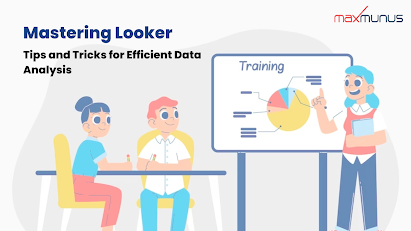Mastering Looker: Tips and Tricks for Efficient Data Analysis
In the dynamic landscape of data analytics, Looker has emerged as a powerful tool for businesses to transform raw data into valuable insights. To truly harness the capabilities of Looker and elevate your data analysis game, you need to master its features and techniques. In this article, we will explore tips and tricks that will help you become proficient in Looker, whether you're an individual learner or part of a team seeking Looker training Online through MaxMunus.
Why Master Looker?
Before delving into the tips and tricks, it's crucial to understand why mastering Looker is vital in today's data-centric world:
Data-Driven Decisions: Looker empowers you to make data-driven decisions by providing real-time access to relevant data and insights.
Enhanced Productivity: A deep understanding of Looker's capabilities can significantly improve your workflow, leading to increased productivity.
Competitive Advantage: Businesses that leverage Looker effectively gain a competitive edge by responding to market changes swiftly and accurately.
Career Growth: Mastering Looker can open doors to rewarding career opportunities in data analytics and business intelligence.
Tips and Tricks for Mastering Looker
Let's explore the tips and tricks that will help you navigate Looker with confidence:
1. Take Advantage of Online Looker Training
Looker Online Training: Enrolling in Looker Online Training programs, like those offered by MaxMunus, provides the flexibility to learn at your own pace. These courses cover everything from Looker basics to advanced data modeling and dashboard creation.
2. Understand Data Modeling
Data Modeling Essentials: Master data modeling in Looker. Learn how to structure your data effectively to create meaningful reports and dashboards.
Explore Derived Tables: Utilize derived tables to preprocess data and create complex calculations, simplifying your analysis.
3. Create Impactful Visualizations
Effective Data Visualization: Learn the art of creating compelling charts and graphs that convey insights clearly. Understand when to use different visualization types.
Custom Visualizations: Explore Looker's custom visualization options to create unique, tailored reports.
4. Embrace SQL Knowledge
SQL Proficiency: Having a strong foundation in SQL is invaluable when working with Looker. Understanding the underlying SQL queries generated by Looker can help troubleshoot issues and optimize performance.
5. Utilize Filters and Parameters
Dynamic Filters: Learn how to create dynamic filters and parameters that allow users to customize their reports, enhancing interactivity.
6. Dashboard Design Best Practices
Layout and Composition: Understand the principles of effective dashboard design, including layout, hierarchy, and color schemes.
Mobile Optimization: Ensure that your dashboards are mobile-friendly for on-the-go access.
7. Implement Data Security
Row-Level Security: Learn how to implement row-level security to restrict data access based on user roles and permissions.
8. Stay Updated
Keep Abreast of Updates: Looker regularly releases updates and new features. Stay informed to take advantage of the latest capabilities.
9. Engage in Hands-On Practice
Hands-On Learning: The best way to master Looker is through hands-on practice. Create your reports and dashboards to reinforce your knowledge.
10. Leverage Looker Community
Community Participation: Join the Looker Community to seek help, share experiences, and learn from other users. It's a valuable resource for problem-solving and idea-sharing.
11. Pursue Looker Certification
Looker Certification: Consider pursuing Looker Certification to validate your expertise. MaxMunus offers training programs that prepare you for Looker Certification exams.
12. Customize Looker for Your Business
Tailor Looker to Your Needs: Learn how to customize Looker for your organization's specific requirements. This includes creating custom fields, templates, and applications.
13. Collaborate Effectively
Collaborative Features: Familiarize yourself with Looker's collaboration tools, such as sharing reports and dashboards, to enhance teamwork.
14. Explore Data Governance
Data Governance with Looker: Understand Looker's role in data governance and how it can help maintain data quality and consistency.
Watch the Video: LOOKER Online Training & Certification Tips
15. Troubleshooting and Debugging
Effective Troubleshooting: Develop the skills to troubleshoot and debug issues in Looker, ensuring smooth operations.
16. Performance Optimization
Optimize Query Performance: Learn techniques to optimize query performance, ensuring that your reports load quickly.
17. Backup and Recovery
Data Backup and Recovery: Understand Looker's data backup and recovery procedures to protect your valuable insights.
18. Integration with Other Tools
Integrate Looker with Other Tools: Explore how Looker can be integrated with other data sources and tools to enhance your data analysis capabilities.
19. Best Practices for Documentation
Documentation Strategies: Adopt best practices for documenting your Looker models, reports, and dashboards to ensure clarity and knowledge sharing.
20. Data Security and Compliance
Data Security Best Practices: Understand data security and compliance requirements relevant to your industry and implement them in Looker.
Also Learn: The Benefits of IBM Business Automation Workflow
Conclusion
Mastering Looker is not only a valuable skill but a strategic asset in today's data-driven business landscape. Whether you're an individual learner or part of a team, MaxMunus Looker training programs provide the foundation you need to become proficient in Looker's capabilities. By following these tips and tricks, you can unlock the full potential of Looker, turning raw data into actionable insights that drive success for your organization.




Comments
Post a Comment